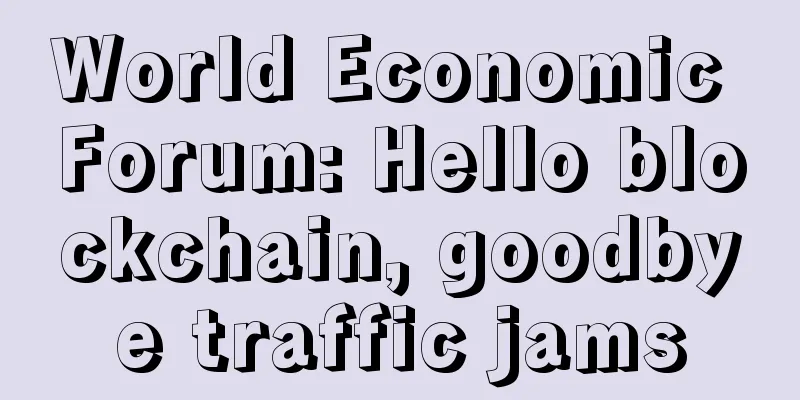World Economic Forum: Hello blockchain, goodbye traffic jams

|
Traffic congestion is a common problem in all cities around the world, seriously affecting economic development and the physical and mental health of office workers. The losses caused by traffic congestion amount to billions of dollars, increasing the stress of office workers, endangering their health, and even leading to premature death in severe cases. Traffic congestion affects health and economic developmentOffice workers are wasting more and more time commuting every day, which increases their fatigue and stress, and also makes them deeply exposed to the harm of pollution. Air pollution caused by traffic congestion is deadly. Traffic jams expose office workers to toxic gases. According to statistics from the Harvard School of Public Health, in 83 major urban areas in the United States, more than 2,200 people die prematurely each year due to traffic jams. In addition, the economic losses caused by traffic congestion are staggering. INRIX, the world's leading provider of road traffic information and driver services, predicts that from 2013 to 2030, the losses caused by traffic congestion in France, Germany, the United States and the United Kingdom can be said to be an astronomical figure -
Self-driving cars, Bitcoin and blockchain could end traffic jamsIn order to alleviate traffic problems, the government has taken a lot of measures in recent years and spent billions of dollars, but traffic congestion has never been solved. Today, thanks to the technologies brought about by the Fourth Industrial Revolution, experts and futurists are optimistic that cities can once again rid themselves of the cancer of traffic congestion. The World Economic Forum (WEF) reports that urban transportation reforms rely primarily on two specific technologies: driverless cars and Bitcoin blockchain technology. The authors, Thomas Birr and Carsten Stöcker, believe that blockchain technology plays an important role in this:
Several teams are already working on specific solutions. In October, a team of PhD students from the Cooperative Research Centre for Spatial Information (CRCSI) proposed a market-based system concept to solve traffic congestion using Bitcoin blockchain technology. During their research, the students came up with an innovative solution: drivers can reserve a space on a road in advance. The route the driver chooses depends on the urgency of the passenger's trip. Usually, a more popular road (a busier road) has a higher reservation fee than an unoccupied road.
In addition, some startups have begun deploying blockchain solutions to ease traffic conditions. For example, La'Zooz has developed a decentralized smart transportation platform based on the Bitcoin blockchain, which is a social carpooling platform. La'Zooz's official website states that this platform can "synchronize vacancies and transportation needs in real time, providing passengers with an excellent carpooling experience at a reasonable price." Bitcoin and its blockchain technology can help developers and entrepreneurs develop innovative solutions to traffic congestion. The combination of Bitcoin's blockchain technology with ride-sharing and driverless technology can completely change urban traffic conditions and provide new solutions to eradicate traffic congestion. |
<<: $43 million worth of Bitcoin, but this company refuses to sell it
Recommend
Blockchain technology company OKInc explores blockchain's potential for financial change
On May 8, 2015, the "Blockchain Financial Te...
7 major cases involving US regulators in the cryptocurrency space in 2020
Original source: Cointelegraph Chinese Original a...
How is the earning ability of a woman with a full Sun Hill?
The Sun Hill is below our ring finger. Women with...
Who is a real good man?
Who is a real good man? For female friends, in ad...
What does a false palm on a woman's right hand mean?
Our palms are all different, and some people may ...
Men with different chin types: face analysis, personality and fortune
In physiognomy, the shape and size of the chin af...
Whatsminer M30S has returned to mass production, Antminer intends to compete with speed in performance
Wu Blockchain exclusively learned that Shenma'...
Is it good or bad for a man to have a flat nose?
In physiognomy, the nose is located in the middle...
How to tell a person's personality from the number of vertical wrinkles on his lips
① People with many vertical wrinkles on their lip...
Where is the best place for a woman to grow a mole
Love of beauty is women's nature. Girls will ...
If you want to start a business on Bitcoin, you first need to be familiar with the law
As a symbol of the heyday of Bitcoin, the Silk Ro...
What does it mean when a woman has small ears?
What does it mean for a woman to have small ears?...
Judging from the face, which people have good fortune and can make a lot of money
When it comes to wealth, we usually divide it int...
The position of moles and their relationship with destiny and fortune The position of auspicious moles
The position of moles and destiny, the position o...
Kazakhstan has become the main choice for many Chinese mainland mine owners to go overseas
“In addition to the booming mining farms, Kazakhs...



![[In-depth analysis] Antminer S19 Pro](/upload/images/67e6a685c1734.webp)





